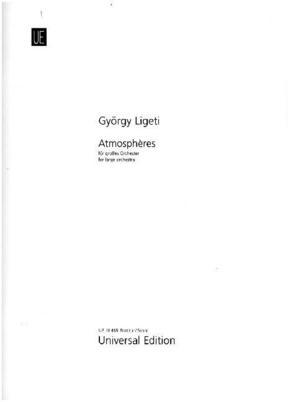Atmosphères - Orchester. Studienpartitur.
| Verlag | Universal Edition |
| Auflage | 2000 |
| Format | 29,5 x 41,0 x 0,3 cm |
| Noten | Studienpartitur | |
| Gewicht | 209 g |
| ISBN-10 | 3702416919 |
| ISBN-13 | 9783702416911 |
| Bestell-Nr | 70241691A |
"Atmosphères" ist György Ligetis zweites Orchesterwerk, das nach seiner Emigration aus Ungarn entstanden ist. Er komponierte es 1961, nachdem der erste Entwurf, den er unter dem Titel "Víziók" noch in Ungarn erarbeitete, keine Chance auf eine Aufführung hatte. In einem Interview wies der Komponist auf drei Vorbilder hin: das Vorspiel zu Wagners "Rheingold", das Vorspiel zu Bartóks "Der holzgeschnitzte Prinz" sowie ein Werk, das er vor 1956 noch nicht kannte: Schönbergs "Farben". Christoph Becher schreibt: "Atmosphères füllt den Konzertraum mit einer Musik, deren Klang sich bewegt, ohne dass in seinen Binnenstrukturen Hierarchien erkennbar wären. Kein Vorder- und Hintergrund, nicht Hauptstimme und Begleitung, nicht Melodie und Akkorde. ...Ligeti hatte die Lieblingsmaterialien der seriellen Schule - Tonhöhen und -dauern - im Strom seines Orchesters ertränkt und stattdessen einen Parameter aus der zweiten Reihe inthronisiert: den Klang." (Bálint Varga)
"Atmosphères" famously overturns all traditional categories of Western classical music. There is absolutely no discernible melody, harmony is reduced to the drifting of saturated chromatic clusters, and pulse - or any sense of normal rhythmical articulation - is entirely absent. All habitual structural sign-posts are also missing as is any relationship to standard forms, despite the ghost of a recapitulation towards the work's end. Instead the listener is confronted with a slow-motion succession of textures, one oozing into the other, where the instrumental sonority seems to have more in common with the dissolves and hums of electronic music than that of a normal symphony orchestra. Tiny traces of influence can just be discerned - perhaps Debussy, a little Richard Strauss, certainly Bartok - though Ligeti's vision is of startling, indeed radical, originality. (George Benjamin)Instrumentation:for orchestra

